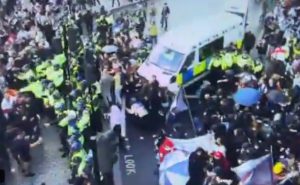The “Unite the Kingdom” march held in London on Saturday 13 September, led by far-right figure Tommy Robinson, has sparked renewed debate over racism, national identity and the treatment of Britain’s minority communities, particularly South Asians, who have been part of the nation’s fabric for centuries.
London’s Metropolitan Police estimated that between 110,000 and 150,000 people attended the rally, far surpassing expectations. While many were drawn by Robinson, Katie Hopkins, and other high-profile anti-immigration activists, not all who took part said they identified with the far-right.
Some attendees told reporters and friends they had joined not out of allegiance to Robinson but out of a sense of frustration and alienation. They cited the cost-of-living crisis, declining trust in politicians, and a longing to “feel proud of my country again.”
Labour MP Clive Lewis shared on social media how a close friend, who said he had no time for Robinson, or Hopkins, attended because he wanted to feel ‘part of something bigger’. “We’ve built since is a society that gives people little to hold in common, no collective story about who we are or what we’re for,” Lewis wrote. His friend, he added, was searching for pride in “a country that is inclusive, fair, and offers a role for everyone… Pride in a nation that tackles grotesque inequality and gives people something real to believe in.”
Lewis warned that if mainstream politics fails to offer a compelling and humane national story, the far right will fill the void, just as authoritarian movements did in the 1930s.
Violence and arrests
The march was marred by violence. Assistant Commissioner Matt Twist of the Metropolitan

Police said officers faced “unacceptable violence” from some protesters, with four sustaining serious injuries, including broken teeth, a possible broken nose, concussion, a prolapsed disc, and a head wound.
“There is no doubt that many came to exercise their lawful right to protest, but there were many who came intent on violence,” Twist said. Twenty-five people were arrested, with police pledging further action as investigations continue.
A long history of South Asian migration
For Britain’s South Asian community, the implications of Robinson’s march are profound. Migration from the Indian subcontinent has a deep-rooted history, stretching back centuries. Early arrivals included lascar sailors who worked on British ships, and ayahs who travelled with colonial families.
But it was after the Second World War that migration accelerated. Facing acute labour shortages, Britain invited workers from Commonwealth nations to help rebuild its economy. Men and women from India, Pakistan, and later Bangladesh arrived to work in industries such as textiles, manufacturing and the NHS.
By the 1960s, new waves arrived, including “twice migrants” of South Asian origin who had settled in East Africa under British rule, before being expelled or forced to leave countries like Uganda and Kenya.
These communities, while facing discrimination and hardship, have profoundly shaped modern Britain. Today, South Asians form a vital part of the country’s social, cultural and economic landscape, with vibrant communities in cities such as Bradford, Leicester, and Birmingham.
Economic contribution
Despite making up less than 10 per cent of the UK’s population, ethnic minority businesses contribute an estimated £25 billion annually to the British economy. From high street curry houses to global firms, from corner shops to tech start-ups, South Asian entrepreneurs have created jobs, built cross-cultural networks and revitalised urban areas.
Community leaders argue that these contributions often go unrecognised in debates dominated by concerns over immigration numbers and integration. “We were invited here to fill a need,” said one Bradford business owner. “Our parents and grandparents worked in the mills, drove the buses, and staffed the hospitals. Now our children are doctors, lawyers, and entrepreneurs. To still be painted as outsiders is deeply unfair.”
National response

Prime Minister Keir Starmer condemned the march’s divisive tone, warning against “poisonous rhetoric” that undermines unity. He stressed that “Britain’s diversity is a strength, not a weakness.”
However, social media has amplified polarisation. Elon Musk’s recent posts questioning the scale of immigration to Britain have been widely shared by Robinson’s supporters. Critics argue that such interventions, from influential global figures, legitimise anti-immigration sentiment and risk undermining efforts at community cohesion.
Tensions in the current climate
For South Asian and other minority communities, there are fears that high-profile far-right events provide cover for hate speech and harassment. Many remember how the National Front and British National Party targeted Asian neighbourhoods in the past.
“Rallies like this embolden the fringe elements who want to blame minorities for Britain’s problems,” said Dr Shaukat Ahmed MBE, author of Bangladeshis in Bradford. “It sends a message that we don’t belong, when the truth is we’ve been part of Britain for generations.”
Community activists also warn that such marches put young people at risk of radicalisation, whether towards far-right extremism or as a defensive reaction.
Community resilience
Despite these challenges, Britain’s South Asian communities have a long record of resilience. From organising self-defence groups in the 1970s to building cultural institutions, they have consistently found ways to assert their place in British society.
Today, their influence stretches across every sector. British Asians are prominent in politics, business, sport and the arts. Their stories represent the reality of modern Britain, multicultural, interconnected and dynamic.
Looking ahead
The Unite the Kingdom march may yet prove to be a fringe event, but its symbolism matters. For many minority communities, it is a reminder that belonging and acceptance remain contested. The debate sparked by Robinson, Musk, and others risks reducing migration to a set of numbers rather than lived experiences.
As Britain faces a future shaped by economic challenges, global conflicts and demographic change, the role of minority communities will remain central. For leaders like Starmer, the task is to ensure the conversation is one of unity rather than division.
“South Asians came here not as strangers but as partners in building Britain,” said one community elder in Southall. “We need to keep telling that story, because it’s the truth. Without us, the Britain we know today would not exist.”




